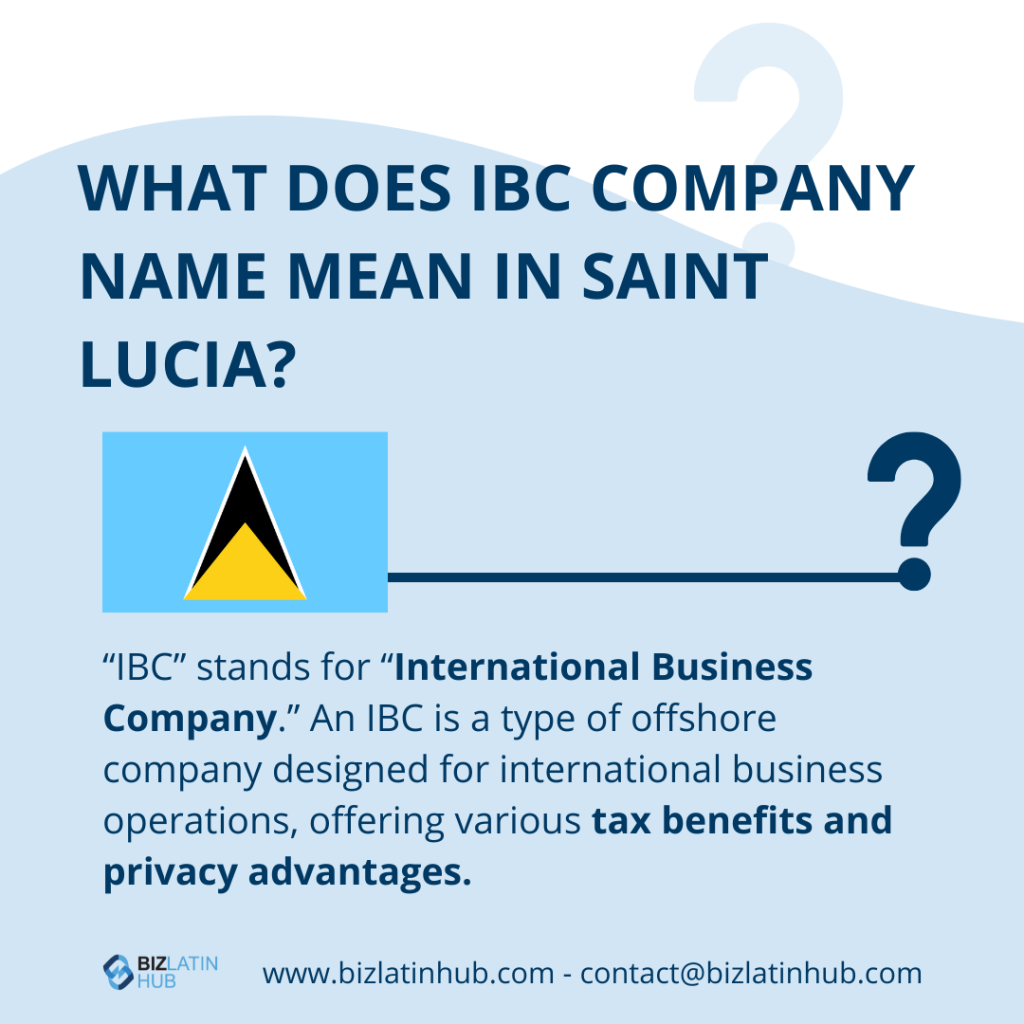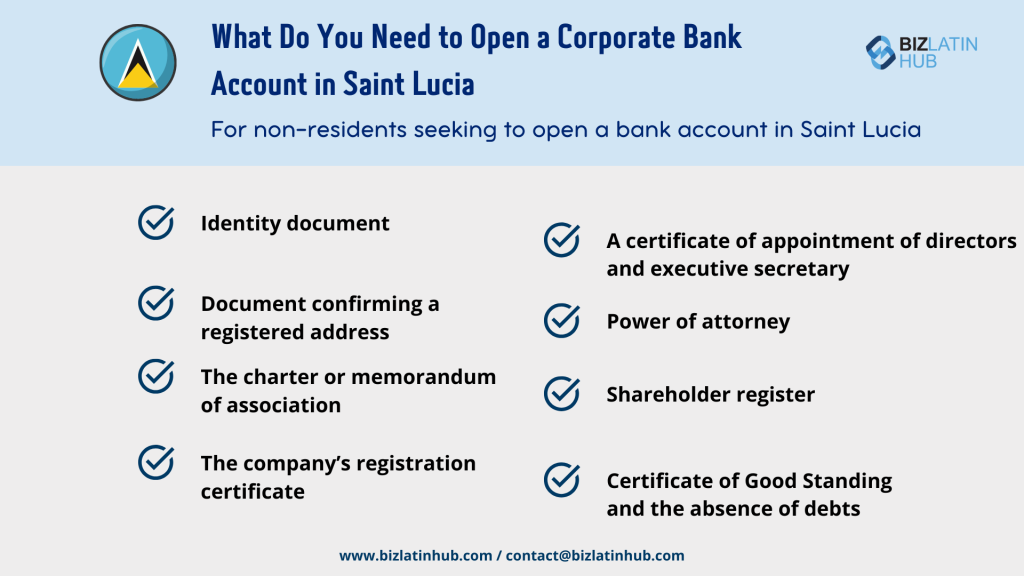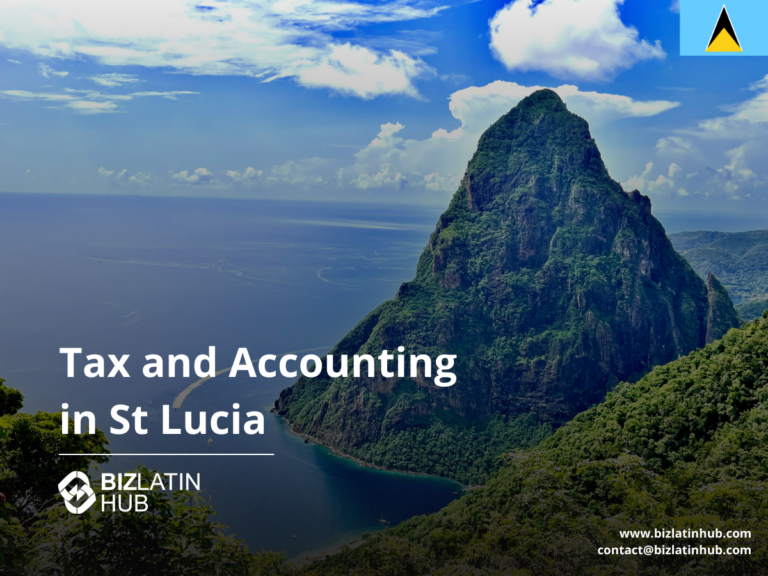The Caribbean nation of Saint Lucia presents promising business prospects for international investors. With a strategic location and advantageous tax regulations, company formation in Saint Lucia makes an excellent hub for launching a business. However, understanding the tax and accounting requirements in Saint Lucia is crucial. In this article, we outline key accounting information and tax rates for achieving success in Saint Lucia. Continue reading to gain essential insights into conducting business in this evolving Caribbean nation.
Key Takeaways Tax and Accounting Requirements in Saint Lucia
| What Are The Accounting Standards in Saint Lucia? | Santa Lucia adheres to globally recognized accounting standards, specifically the International Financial Reporting Standards (IFRS), ensuring a high level of financial transparency and consistency with international practices. |
| What Is The Corporate Tax Rate in Saint Lucia? | Santa Lucia boasts a competitive corporate tax rate of 30%, positioning it as an attractive destination for businesses seeking a favorable fiscal environment. IBCs pay no corporation tax. |
| What Is The Saint Lucian Value Added Tax Rate? | The standard VAT rate stands at 12.5%, and specific goods and services may attract a 0% rate. Notably, the hotel sector and associated services are subject to a 10% rate, while a reduced rate of 7% for tourism accommodation services has been in effect since December 1, 2020. |
| Dividend Tax Rate in Saint Lucia | Dividends are tax-exempt in Saint Lucia. |

What is the tax system in Saint Lucia?
The tax regulations in St Lucia are straightforward. Citizens enjoy exemptions from capital gains, dividends, and inheritance taxes, while legal entities are spared taxes on capital gains, dividends, and occasionally value-added tax (VAT).
To attain tax residency in St Lucia, individuals must spend a minimum of 183 days in the country annually. Similarly, companies must either be registered within St Lucia’s jurisdiction or managed through permanent missions to be recognized as tax residents.
Failing to meet these criteria means you won’t be acknowledged as a tax resident in St Lucia, obliging you to pay taxes on any income earned on the island.
Tax and accounting requirements in Saint Lucia: Key local tax rates
Understanding accounting and taxation requirements in Saint Lucia is essential when entering this market. Here is a selection of key tax rates.
Income Tax
The country employs a progressive taxation system, wherein individuals with greater wealth are subject to higher tax rates. Whether one is a tax resident or nonresident, income up to EC$18,400 remains untaxed, with fixed rates applied to amounts exceeding this threshold. For example, those earning over $48,401 pay a 30% tax rate.
Corporate Tax:
Companies holding tax residency in Saint Lucia incur a flat 30% tax rate on gains or profits acquired directly or indirectly from all sources within the country. However, this rate applies solely to companies with no tax arrears and compliance with pre-2003 income year regulations administered by the Inland Revenue Department (IRD). For companies with tax arrears or non-compliance, the tax rate remains at 33.33%. Adherence to tax regulations and compliance is essential for determining the applicable tax rate.
Value-added Tax
The standard VAT rate stands at 12.5%, and specific goods and services may attract a 0% rate. Notably, the hotel sector and associated services are subject to a 10% rate, while a reduced rate of 7% for tourism accommodation services has been in effect since December 1, 2020.
Capital Gains Tax:
There is no capital gains tax in Saint Lucia.
Commercial Property Tax:
An annual assessment of 0.4% of the open market value determines the commercial property tax. Property owners must secure a commercial valuation to establish the property’s open market value. Additionally, newly completed commercial properties after April 1, 2001, are eligible for a three-year exemption from commercial property tax.
Social Security
Employees contribute 5% of their gross salary to the NIC (National Insurance Corporation) for retirement, sickness, and disability benefits, with a maximum monthly contribution capped at XCD 250 (applicable to a monthly salary of XCD 5,000). Employers match this contribution and are responsible for filing monthly returns.
Double taxation treaties
St. Lucia, as a CARICOM member, has established double taxation agreements with several countries. These include Antigua and Barbuda, Barbados, Belize, Dominica, Grenada, Guyana, Jamaica, Montserrat, St Kitts and Nevis, St Vincent and the Grenadines, and Trinidad and Tobago. These agreements aim to prevent the occurrence of double taxation and foster economic cooperation between St. Lucia and its partner nations.

FAQ when understanding tax and accounting requirements in Saint Lucia
Based on our extensive experience, these are the common questions and concerns of our clients when seeking to understand accounting and taxation requirements in Saint Lucia.
Santa Lucia boasts a competitive corporate tax rate of 30%, positioning it as an attractive destination for businesses seeking a favorable fiscal environment.
Businesses in Santa Lucia follow a tax structure that applies to net profit before depreciation, a strategy designed to promote financial growth and stimulate economic development.
The regulatory authority overseeing taxation matters in Santa Lucia is the Inland Revenue Department, reflecting the nation’s commitment to efficient and transparent fiscal governance.
Santa Lucia adheres to globally recognized accounting standards, specifically the International Financial Reporting Standards (IFRS), ensuring a high level of financial transparency and consistency with international practices.
In Santa Lucia, the ACCA (Association of Chartered Certified Accountants) holds the equivalent status to CPA (Certified Public Accountant). However, the professional landscape is inclusive, allowing various accounting bodies to practice and contribute to the nation’s financial expertise.
Biz Latin Hub can manage tax and accounting requirements in Saint Lucia
At Biz Latin Hub, we offer a comprehensive range of market entry and back-office solutions in Latin America and the Caribbean.
Our team has expertise in tax and accounting requirements in Saint Lucia, with legal services, accounting and taxation, hiring, and visa processing available.
We maintain a significant presence in the LATAM region, bolstered by robust partnerships that span the area. This extensive network equips us with many resources to facilitate international projects and expand into new markets across various countries.
Contact us today to learn more about our services and how we can help you achieve your business goals in Latin America and the Caribbean.





